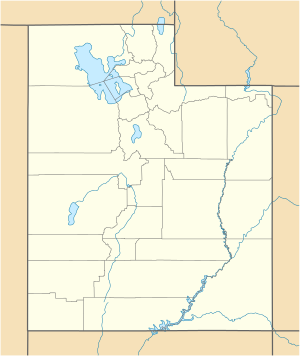Utah World War II Army Airfields
| Utah World War II Army Airfields | |
|---|---|
| Part of World War II | |
Map Of Utah World War II Army Airfields | |
| Type | Army Airfields |
| Site history | |
| Built | 1940-1944 |
| In use | 1940--present |
During World War II, the United States Army Air Forces (USAAF) established numerous airfields in Utah for training pilots and aircrews of USAAF fighters and bombers.
Most of these airfields were under the command of Second Air Force or the Army Air Forces Training Command (AAFTC) (A predecessor of the current-day United States Air Force Air Education and Training Command). However the other USAAF support commands (Air Technical Service Command (ATSC); Air Transport Command (ATC) or Troop Carrier Command) commanded a significant number of airfields in a support roles.
It is still possible to find remnants of these wartime airfields. Many were converted into municipal airports, some were returned to agriculture and several were retained as United States Air Force installations and were front-line bases during the Cold War. Hundreds of the temporary buildings that were used survive today, and are being used for other purposes.
Major Airfields
[edit]Proving Ground Command
- Dugway Army Air Field, Tooele
- Now:
 Michael Army Airfield
Michael Army Airfield
- Part of: Dugway Proving Ground (United States Army)
Air Technical Service Command
- Hill Field, Clearfield[1]
- Ogden Air Depot, 12 January 1939-3 January 1955
- 482nd Base Headquarters and Air Base Squadron, 2 January 1943-1 April 1944
- 4135th Army Air Force Base Unit, 1 April 1944-28 August 1948
- Now:
 Hill Air Force Base
Hill Air Force Base - And:
 Ogden Air Logistics Center
Ogden Air Logistics Center
Army Air Forces Training Command
- Army Air Forces Replacement Training Center/Army Air Forces Basic Training Center No.5, 1 May 1942-30 September 1943
- Army Air Forces Overseas Replacement Depot, 20 July 1942-30 April 1944
- Assigned to Second Air Force, 1 October 1943
- 363rd Base Headquarters and Air Base Squadron, 1 October 1943-24 March 1944
- Operational airfield of Kearns Army Air Base (AAFTC)
- Now: South Valley Regional Airport (FAA LID: U42)
- Salt Lake City AAB/APT, Salt Lake City
- Joint Use USAAF/Civil Airport as freight terminal
- Now: Salt Lake City International Airport (IATA: SLC, ICAO: KSLC, FAA LID: SLC)
- And:
 Salt Lake City Air National Guard Base
Salt Lake City Air National Guard Base
- Wendover Field, Wendover, Utah
- Was: Wendover Air Force Base (1947-1965)
- Now: Wendover Airport (IATA: ENV, ICAO: KENV, FAA LID: ENV)
- Auxiliary fields: (Delle AF Aux 40°45′45″N 112°47′14″W / 40.76250°N 112.78722°W, Knolls CAA 40°44′07″N 113°13′50″W / 40.73528°N 113.23056°W, Low Flight Strip)
- Note: Delle was reported to have had an "asterisk" type layout, runways under 2000' in length. Aux to Wendover AAF and to Salt Lake City AAB. Later taken over by a private person and some remains can be seen. Two of the runways were paved by the new owner and can be seen still. It has been reported that occasionally aircraft have been seen there, assume private and uncharted and unlisted. No other data on this field exists. Status assumed closed.
- Note: Knolls was a 3000x3000' all way field; clay. used by Wendover as an Aux for light aircraft (e.g.L4). Some indications that a few P-47 ops took place as well
- Auxiliary fields: (Delle AF Aux 40°45′45″N 112°47′14″W / 40.76250°N 112.78722°W, Knolls CAA 40°44′07″N 113°13′50″W / 40.73528°N 113.23056°W, Low Flight Strip)
References
[edit]- ^ Mueller, pp. 237-242
- Maurer, Maurer, ed. (1983) [1961]. Air Force Combat Units of World War II (PDF) (reprint ed.). Washington, DC: Office of Air Force History. ISBN 0-912799-02-1.
- Maurer, Maurer, ed. (1982) [1969]. Combat Squadrons of the Air Force, World War II (PDF) (reprint ed.). Washington, DC: Office of Air Force History. ISBN 0-405-12194-6.
- Mueller, Robert (1989). Air Force Bases, Vol. I, Active Air Force Bases Within the United States of America on 17 September 1982 (PDF). Washington, DC: Office of Air Force History. ISBN 0-912799-53-6.
- Thole, Lou (1999), Forgotten Fields of America : World War II Bases and Training, Then and Now - Vol. 2. Pictorial Histories Pub . ISBN 1-57510-051-7
- Military Airfields in World War II - Utah




